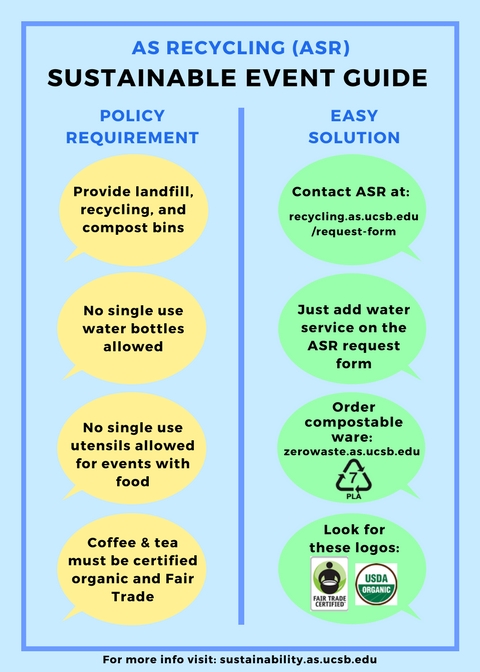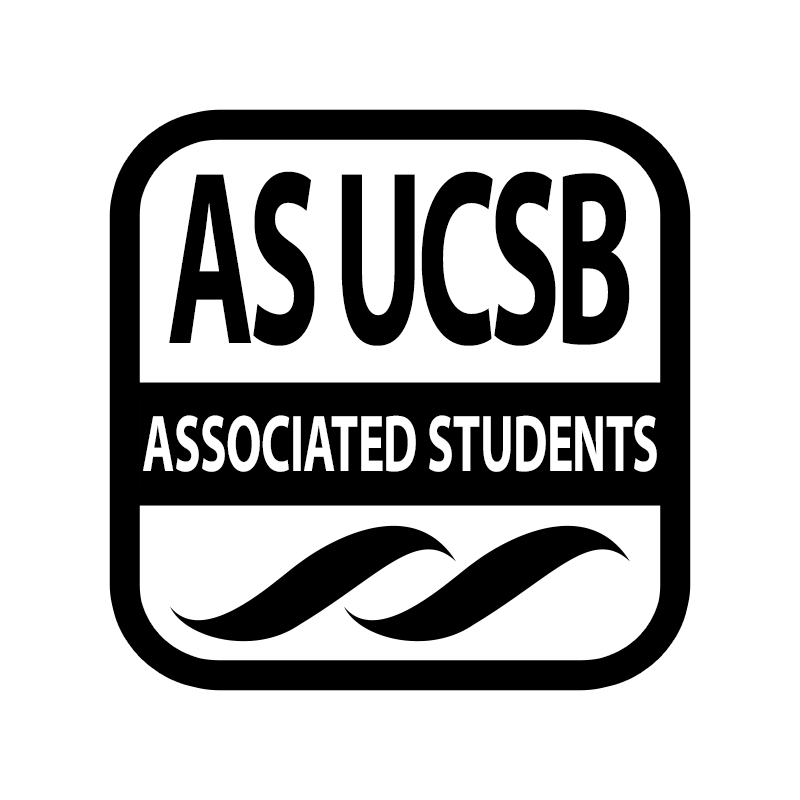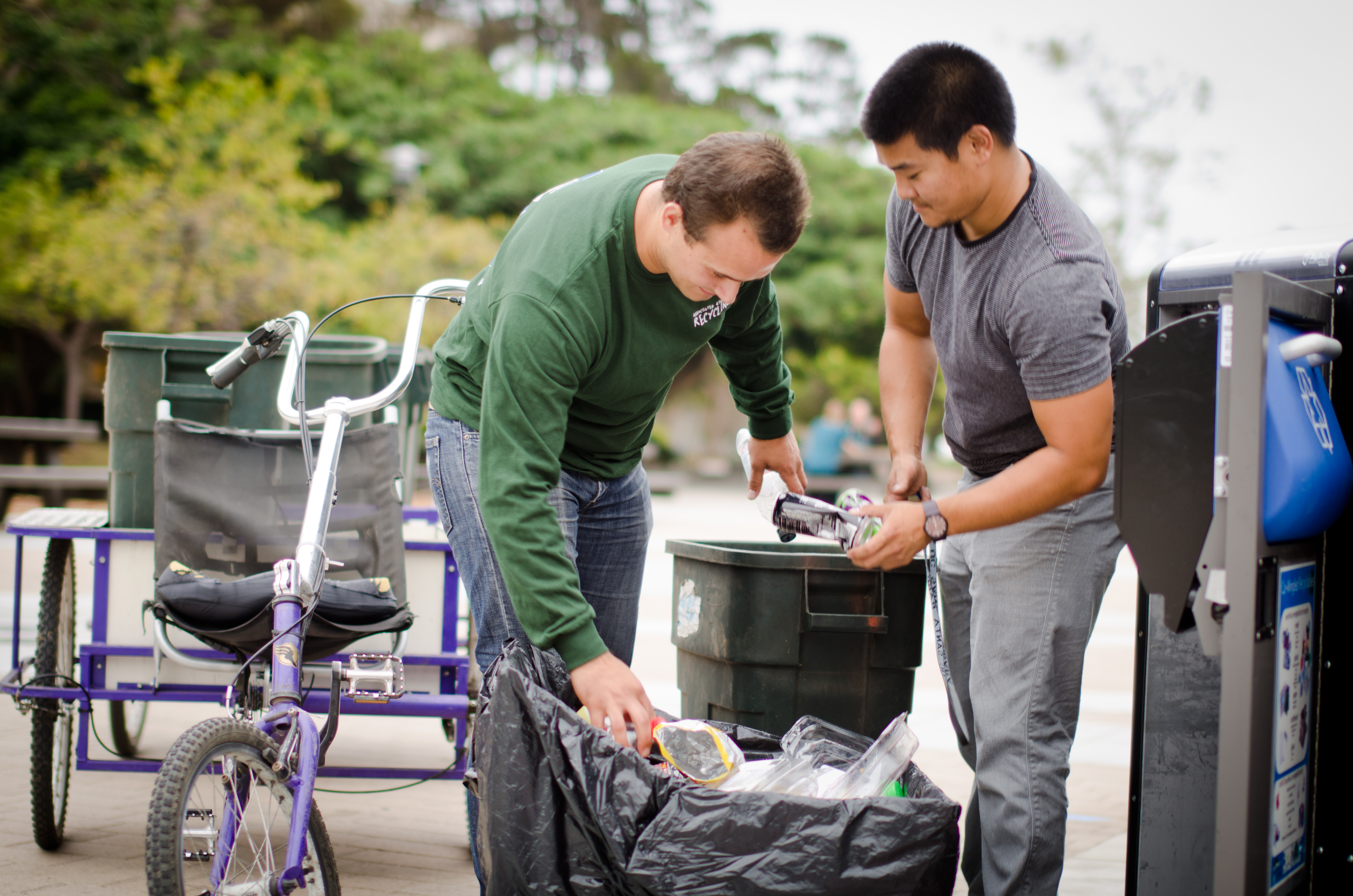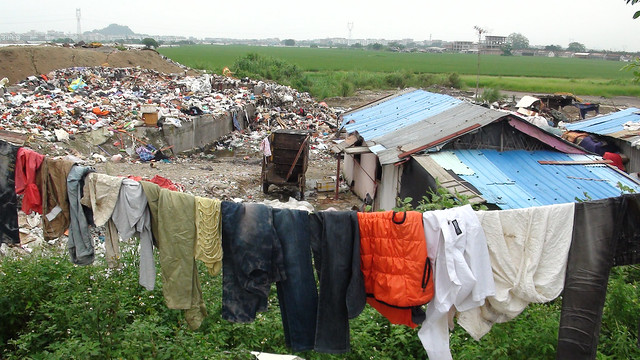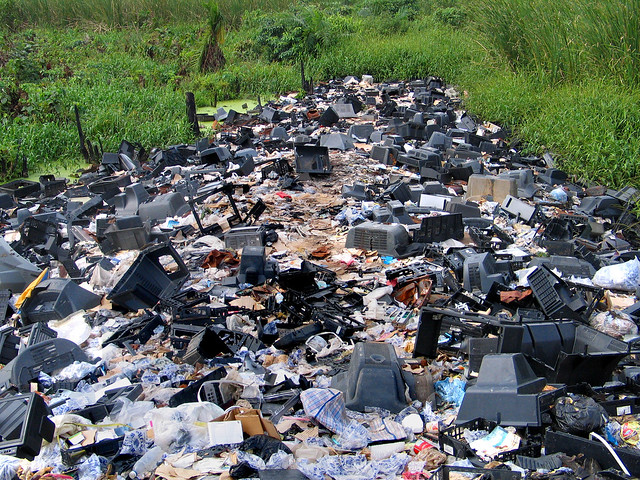INTRODUCTION
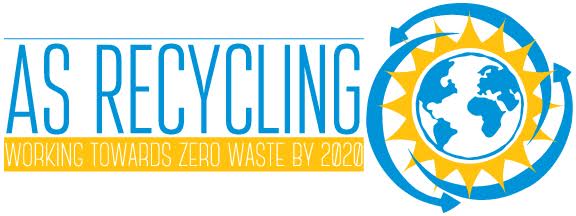
The mission of AS Recycling is to reduce waste at UCSB both through direct collection and through education and information sharing. Its members believe that true environmental progress requires direct, hands-on action and personal responsibility, not just ideals and slogans. Along with it’s partner organization The Department of Public Worms, AS Recycling is deeply committed to day-to-day recycling, composting, and electronic waste collection services that have helped make UCSB a state and national leader in waste reduction for nearly 20 years. It also recognizes that teaching students and staff how to recycle, compost, and reduce waste can have a huge impact both on and off campus, and is the only way to achieve lasting change. Recycling’s stated goal was zero waste by 2020 at UCSB! Although this was not to be, students continue to provide this critical service to the campus.
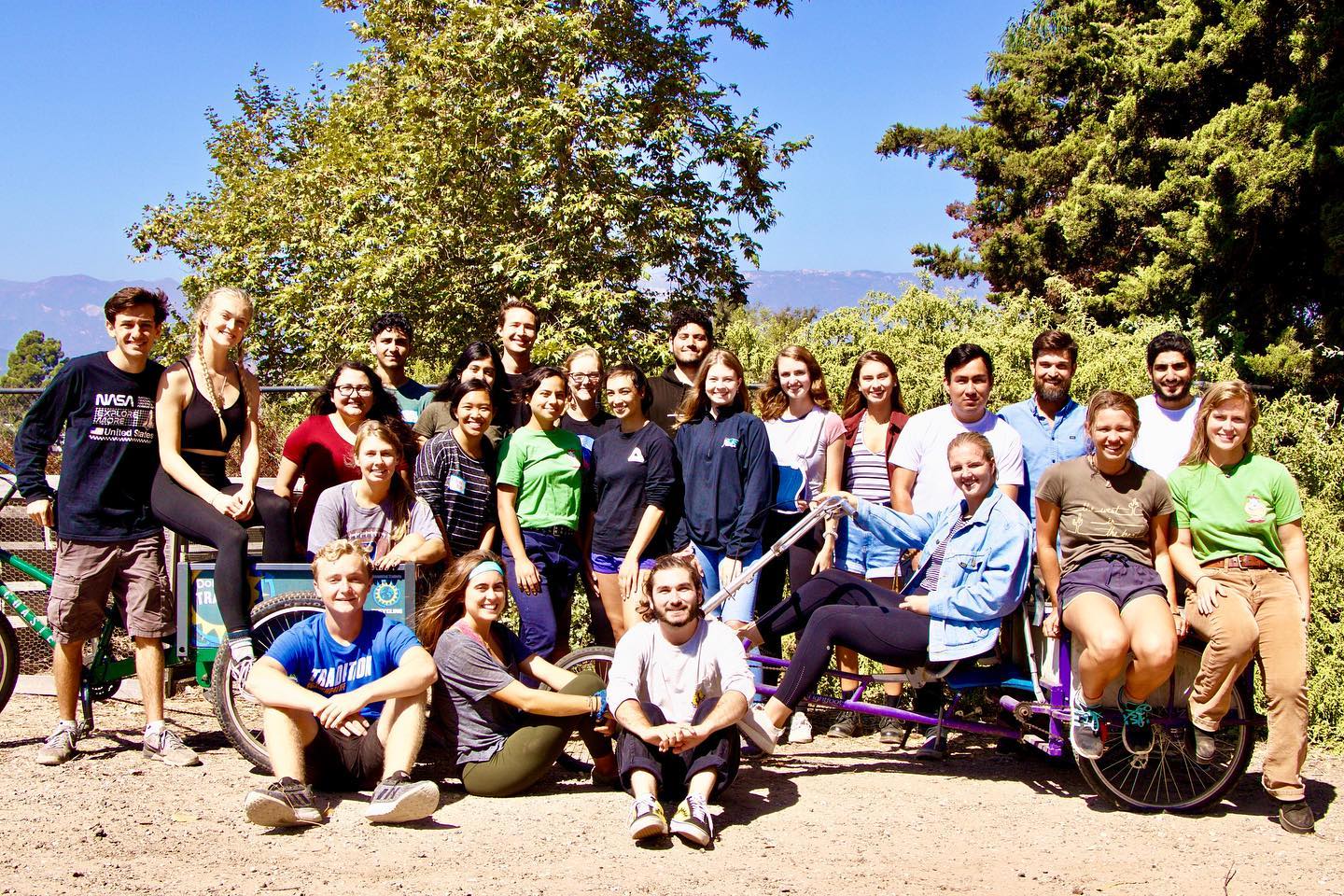
Recycling & Department of Public Worms staff
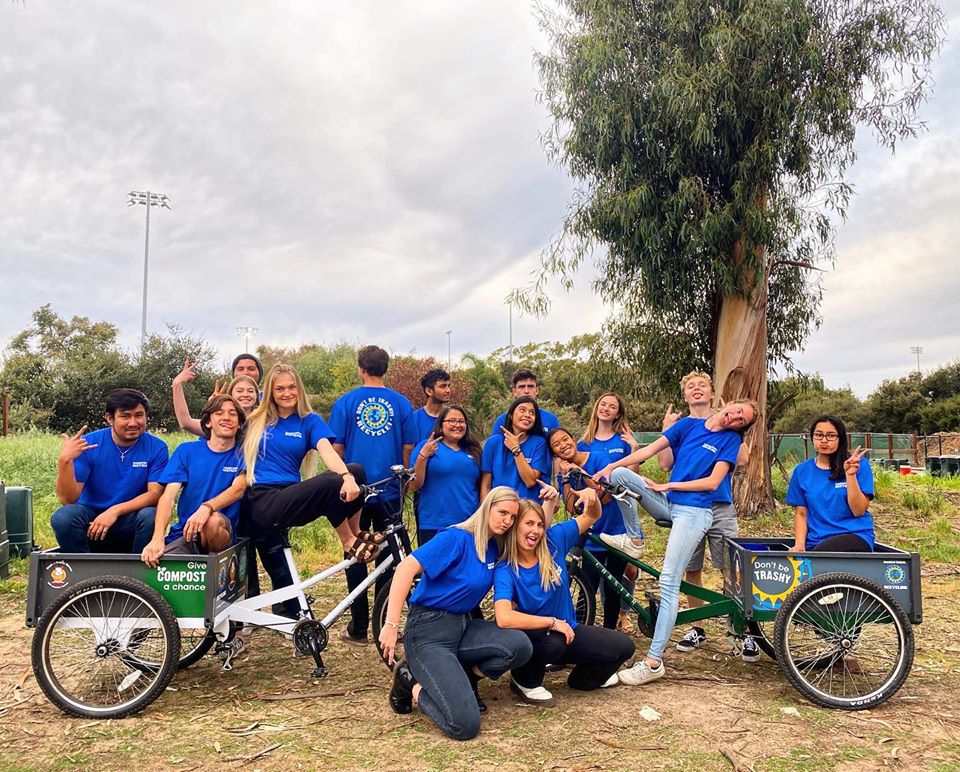
AS Recycling
HERE’S WHAT AS RECYCLING HAS BEEN UP TO THIS YEAR
Summer Quarter
California Higher Education Sustainability Conference
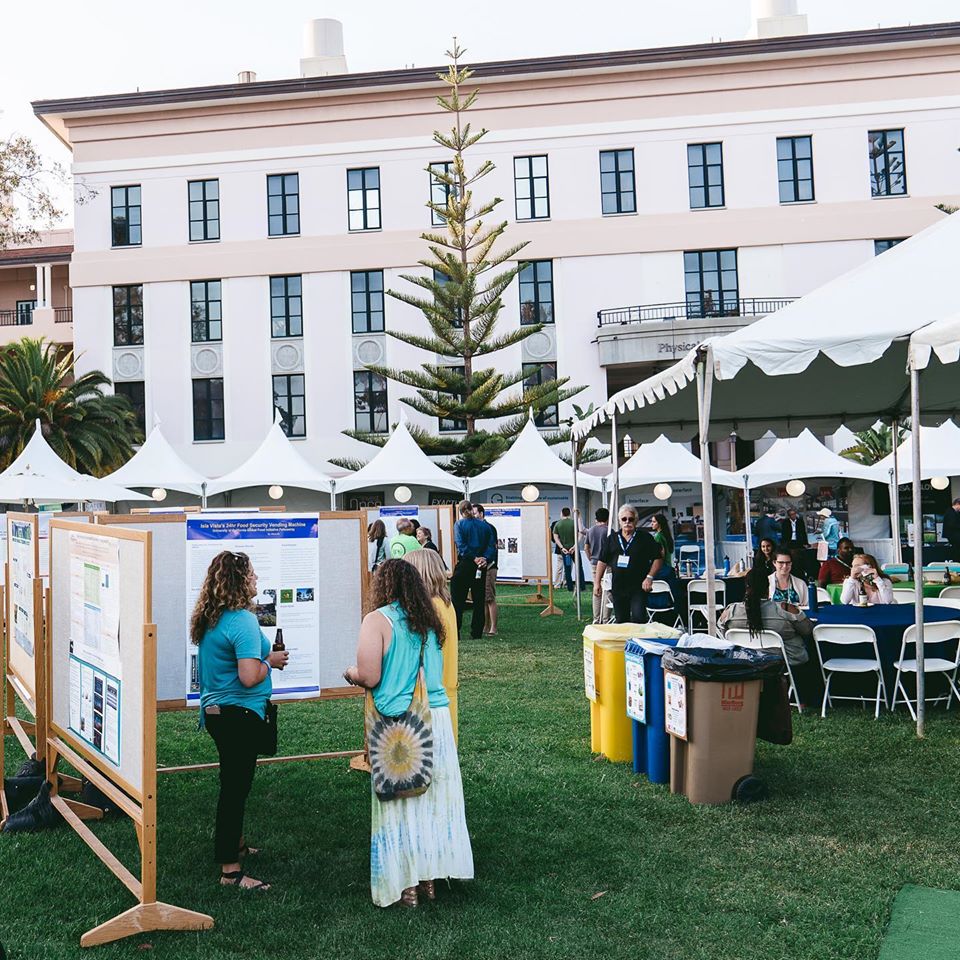
California Higher Education Sustainability Conference at UCSB
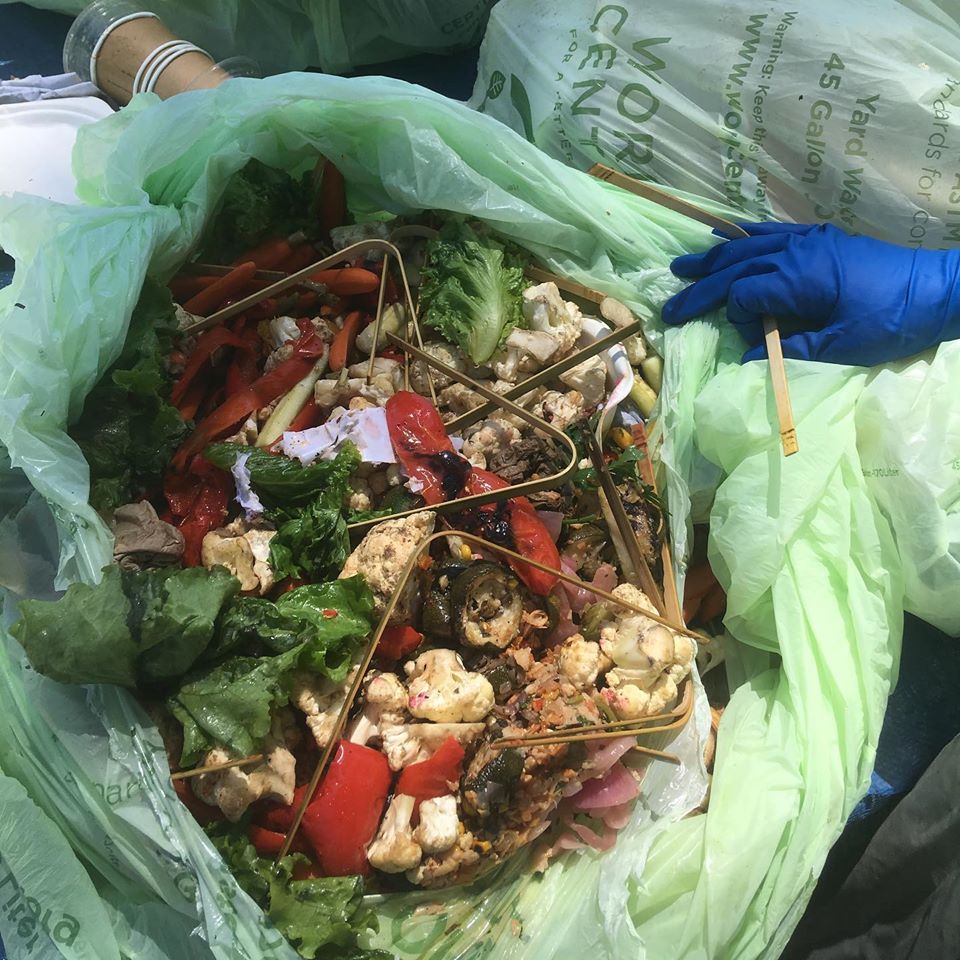
Too much food waste!
This year UCSB hosted the California Higher Education Sustainability Conference, where students and staff shared ideas and successes on their work towards a greener future.
ASR collected all the waste from the conference, in their yellow, blue, and brown toters! At the end of the conference, they audited all the waste and determined how well the conference attendees sorted. Unfortunately, they found a lot of food waste, so room for improvement even among folks who are part of the sustainability community!
HOW WASTE IS HANDLED
The Recycling website provides detailed information about how different kinds of waste are handled. These include Recycling, Composting, Electronic Waste, and Hazardous Waste. These links are to current practices. Here’s how Recycling handled waste during the year of this edition of Flashback as described on their website at the time of this writing:
Recycling
Recycling is a great way to reduce not only the amount of waste being sent to landfills every day, but also to reduce the need to harvest new materials from environmentally destructive processes like mining and timber collection. UC Santa Barbara’s now robust recycling program actually began with AS Recycling and has since grown to include ASR, Facilities, Central Stores, Environmental Health and Safety, Housing and Residential Services and other campus departments all working alongside our campus waste hauler Marborg.
We are very lucky in Santa Barbara County that so many items can be recycled. Below is a brief list of recyclable materials as well as non-recyclable materials that often get put into recycling bins. Of course, being able to recycle a lot of different products doesn’t help if the recyclables don’t make it into the proper bin so, UCSB has developed an impressive recycling infrastructure to make sure everything gets to the right place. Visit our campus resources page to learn more about UCSB’s recycling infrastructure!
Recyclable material:
The following materials can be placed in blue recycling bins.
- All metals
- Bottles and jugs #1 and #2
- PLA #7 is compostable
- All glass other than Pyrex, lab glass, and mirrors
- Clean, unwaxed paper and corrugated cardboard (i.e.: Amazon box is corrugated, a cereal box is not)
- Untreated wood
NOTE: Items made up of multiple recyclable materials are not recyclable. For example, a sheet of laminated paper is made up of paper and plastic but it is not recyclable.
Non-recyclable material:
The following materials are often mistakenly categorized as recyclable. Please do not put them in the blue recycling bins.
- Plastic bags/ film plastic
- Styrofoam
- Plastics #3 through #7
- Anything that is not a bottle or jug #1 or #2
- Chipboards such as cereal boxes non-recyclable
Recyclable e-waste:
The following materials can be place in e-waste recycling bins.
- Electronics
- Batteries
Composting
Most Americans are now familiar with recycling and how it helps reduce the amount of waste we generate, but recycling alone is not enough to eliminate the impact of larger and larger human populations that produce and discard more and more each year especially because not all types of waste can be recycled. 21% of landfill waste in the US is actually made up of food, and yard waste accounts for another 9% (source and more information). The best way to reduce this contribution is through composting.
Composting is the act of turning organic waste, which includes food scraps and yard and landscaping trimmings into a soil-like product that can be used to aid plant growth and development. Certain plates, cups, utensils and other items can also be certified as compostable. There are several different methods of composting with each method being ideal for different situations and different material inputs, and there are also plenty of ways you can compost in your own home. The City of Santa Barbara and UCSB are also working to increase composting at the community and campus level, respectively.
For more information on composting at home or on-site, check out Department of Public Worms!
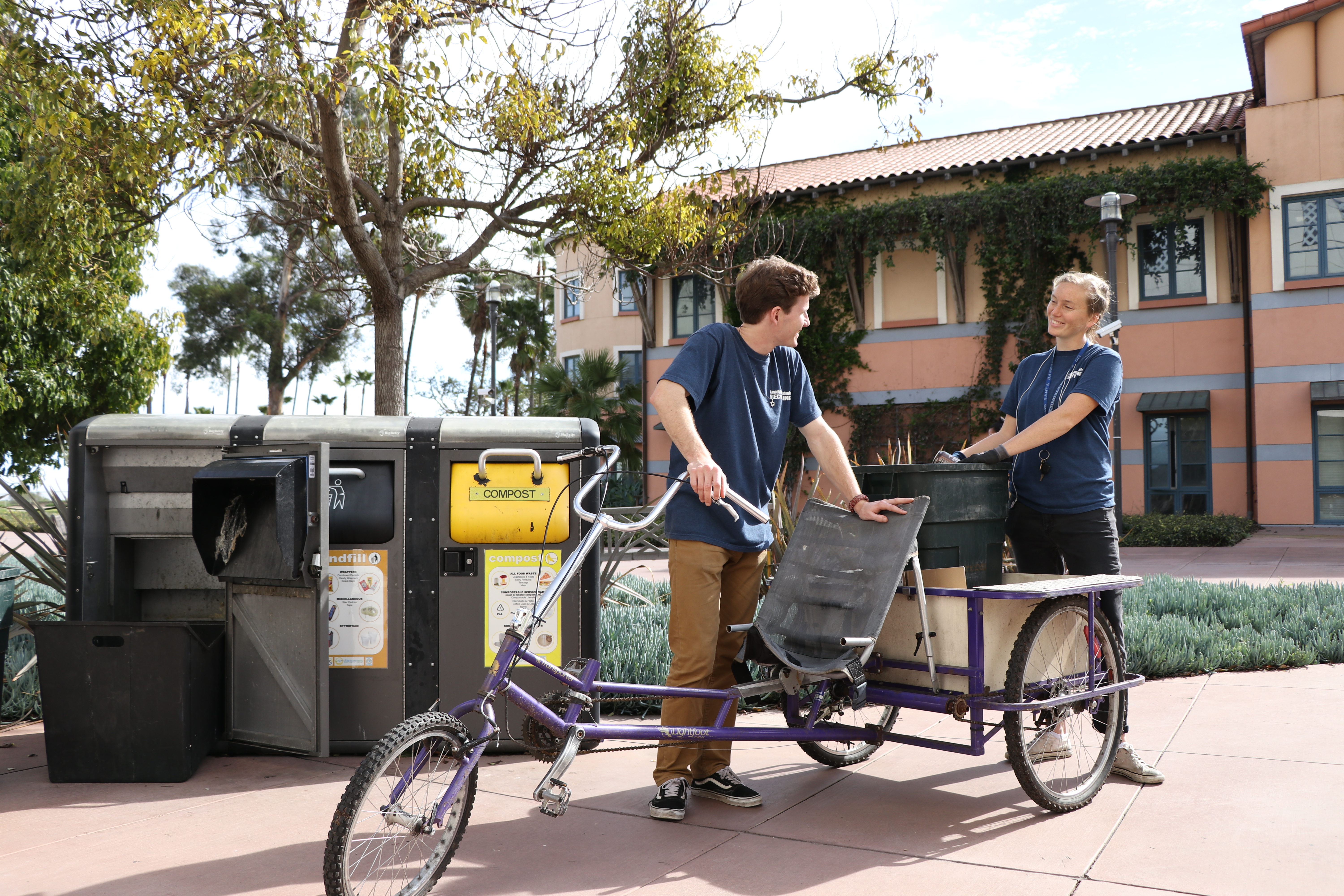
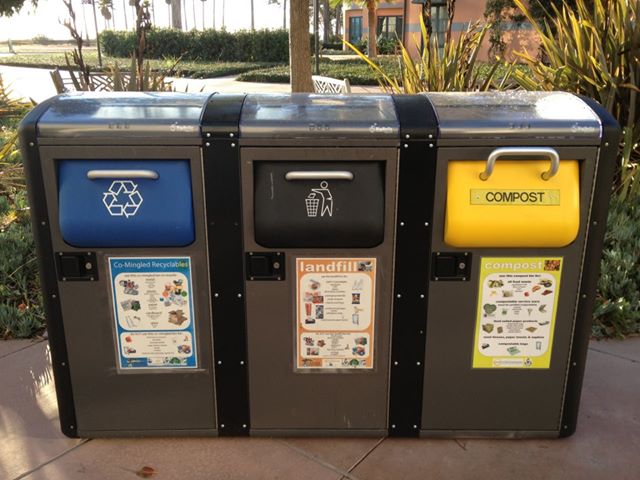
Composting at UCSB
UCSB has a robust composting infrastructure that is improving every day. We have programs in place that process compostable waste both on and off-site, to divert as much organic waste from the landfill as possible.
Big Belly Compost Bins
Anyone at UCSB can use one of our compost drop-off bins for food and compostable service ware products! We can accept a wide variety of organic waste because we send the bulk of this waste to a commercial composting facility in Santa Maria, Engel & Gray. Engel & Gray’s 90-day cycle (as opposed to the 45-day cycle some other facilities use) let’s us use compostable plates, utensils, and other items and be assured that they will completely break down. It also allows us to compost a wider variety of material– meat, dairy and oils are not a problem for a large-scale facility.
Composting at the Dining Commons and UCen
Housing and Residential Services Dining Commons and the UCen send the majority of their food waste off-site to Engle & Gray. Both departments compost all scraps from the kitchen (peels, stems, the parts that don’t make it onto your plate). The Dining Commons also compost all food waste left on your plate. The on-campus food vendors provide compostable ware such as plates, cups, and utensils, which can all go into the compost bins. A small amount of food waste from the Dining Commons is collected by the Department of Public Worms and composted at their on-site compost facility at UCSB.
Grounds to Grounds
Grounds to Grounds is another major on-site composting program. Facilities grounds staff collect buckets of used coffee grounds and filters from the campus cafes each day and add them straight into the campus landscaping beds where they break down quickly and add plenty of nitrogen to the soil! You may have heard that coffee grounds are too acidic to be used directly like this, but in reality almost all of the acid is washed out during the brewing process. This program composts about 20 tons of coffee grounds per year!
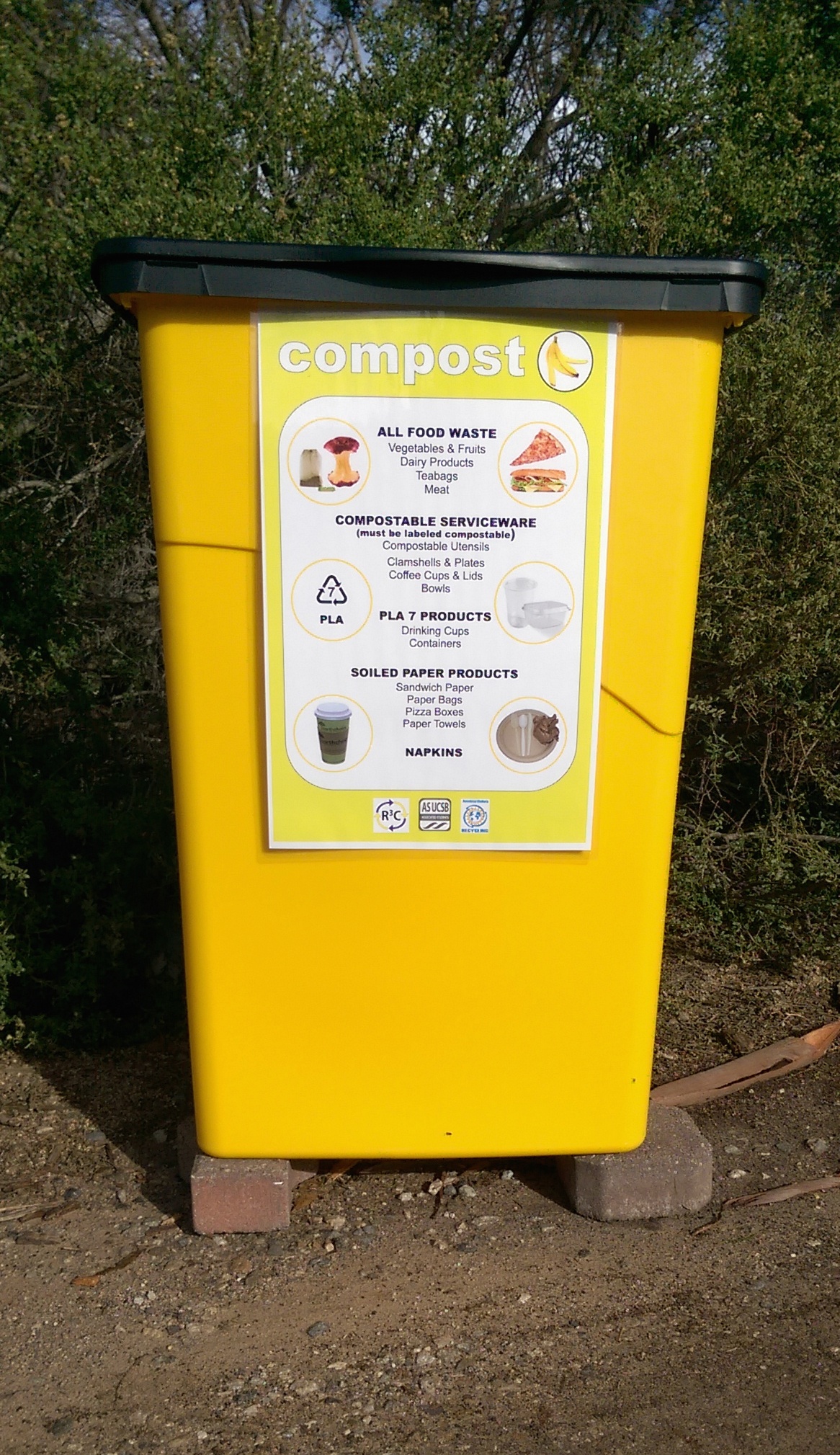
Indoor Composting Program
AS Recycling also manages an indoor composting program. We provide yellow bins with hinged lids to departments interested in diverting food waste in their office kitchens from the landfill. Any department who requests a bin will receive an informational composting presentation and a descriptive sign to accompany their bin. To request a compost bin for your office, click the button below.
We take multiple steps to ensure our bins are sanitary. We include a hinged black lid on our bins to reduce the chance of odors and flies. We also line the bins with bags and empty them three to five times per week. Please contact us with any questions or concerns!
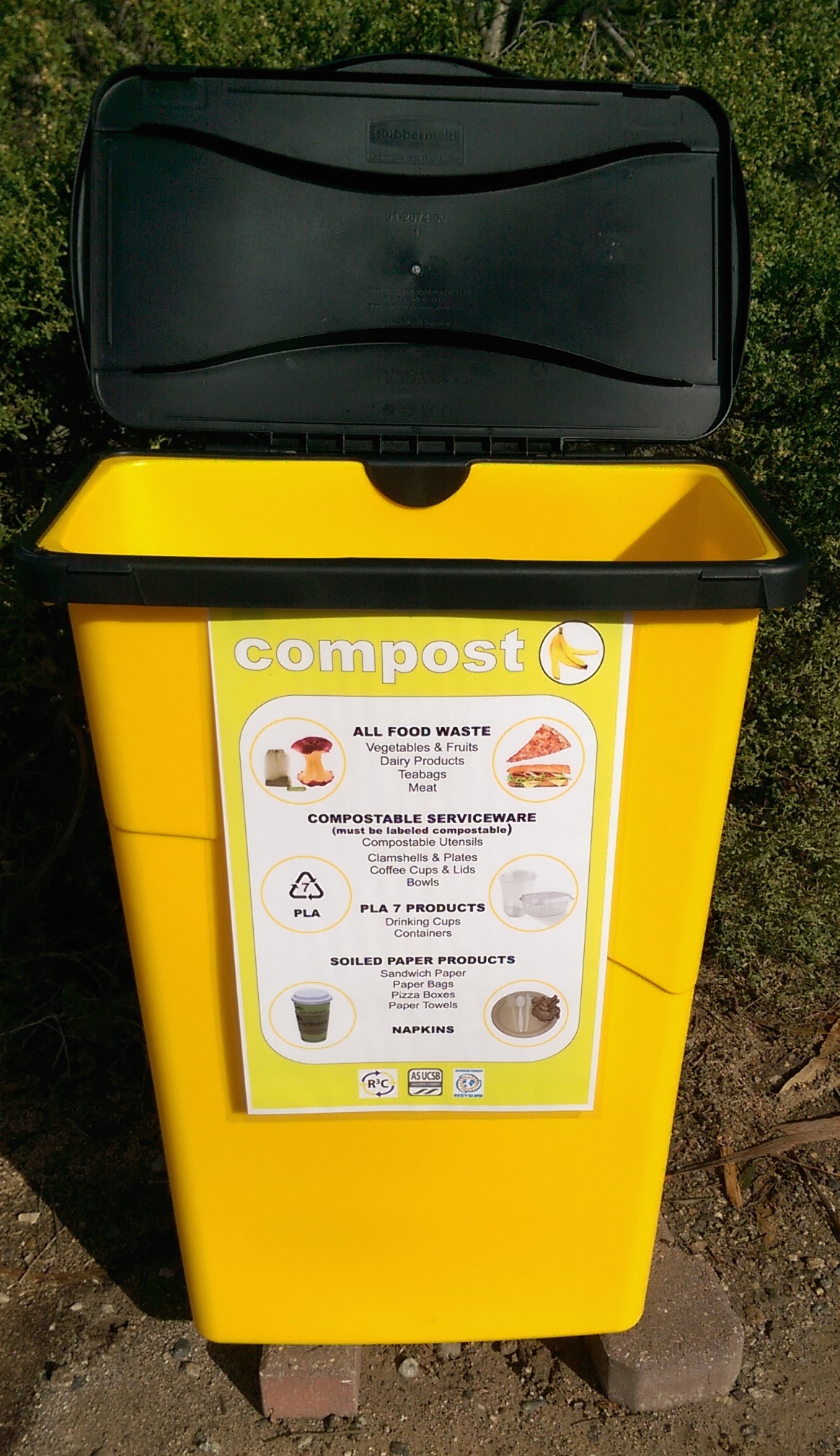
What can go in the bin:
-
ALL food scraps, including meat, dairy, and oils
-
Compostable products, including all coffee cups and lids, to-go containers, utensils and cups purchased from most campus eateries. Many plastic-looking compostable items are marked with a recycling symbol with the number 7, and the abbreviation PLA.
-
Napkins, wet or soiled paper, etc.
What can’t go in the bin:
-
Plastic bags or containers– if you bring your compostables to the bin in a bag, please take the bag back with you
-
Milk or ice cream cartons
-
Paperboard (i.e. cereal boxes)
-
Receipts
-
Metal, plastic, glass, styrofoam
Electronic Waste
Electronic waste is a growing problem in an increasingly technologically focused world. Devices go obsolete quickly, and many consumers simply discard old, perfectly functioning equipment as soon as a newer model is available. Consider cell phones and other mobile devices, as they have become especially prevalent in the US with ten times as many units sold in 2010 compared to 2000. These devices have a shorter average lifespan than any other type of electronic equipment, and of the 141 million mobile devices that were discarded in 2009 in the US alone, (nearly one discard for every two people per year), only 8% were recycled (source). Where did the rest end up?
When e-waste isn’t recycled properly it ends up in a landfill, often in very poor countries where it may be burned or just left in or near poverty-stricken communities. All of those wires and circuit boards are filled with heavy metals that leach into water and come in contact with local people and wildlife. These compounds can cause cancer, reproductive disorders, endocrine (hormone) disruption, and many other health problems. Many chemicals don’t break down over time or with processing and instead accumulate in the food chain, which can magnify the effect. In Guyiu, China, for example, e-waste incineration has resulted in the accumulation of ash piles with 200 times as much lead as would be legal in the US, and 82% of young children have lead poisoning (source).
E-waste is a growing concern as more and more devices are replaced and discarded. The UC system took a strong position against e-waste several years ago, and requires that all e-waste from a UC campus is always recycled with the strongest environmental standards and is never sent overseas. See what we’re doing here, and what you can do if you’re not a UCSB student or staff member but would still like to recycle your e-waste properly here.
Hazardous Waste
Disposing of Hazardous Waste
If you are a student, staff, or faculty member at UCSB, you can dispose of batteries and CFL light bulbs at many of our electronic waste dropoff locations. If you have a small amount of paint or other universal waste, contact us and we will determine if it is something we can handle as a special pickup. If you have other hazardous waste, such as those from a lab or machine shop, contact your building manager or UCSB Environmental Health and Safety for help.
If you are not affiliated with the UCSB campus, please check the Community Hazardous Waste Collection Center page. While this facility is located at UCSB, it is NOT affiliated with AS Recycling so please contact them directly with any questions. Please visit www.lessismore.org for more information.
Hazardous waste is officially defined in multiple ways. The EPA maintains a list of specific compounds that are considered hazardous, but has also identified four characteristics (ignitability, corrosivity, reactivity, and toxicity) that can define waste as hazardous even if it is not specifically listed. There are also mixed wastes, which are both hazardous and radioactive, but unless you are running a nuclear power plant you shouldn’t have to worry much about this.
Most relevant for most people and households is what’s called universal waste. Universal waste includes items that, while still hazardous waste, are commonly used by individual consumers and do not require special training to handle. Batteries, fluorescent bulbs, paint, oil and pesticides are all considered universal waste. The regulations on these are generally reduced to improve the ability for places like hardware stores and other outlets to run collection programs and therefore reduce the chance that consumers will simply throw these wastes in the trash.
EVENT SERVICES
Recycling is also there for campus events and has a system in place to ensure that campus groups can host events that are green and sustainable.
Here’s how it was done this year as described on the Recycling website
Campus events produce a large amount of waste. Often well-intentioned event planners carefully purchase recyclable or compostable plates and other products for their event, but the park or facility where the event is held only has trash bins and everything goes to the landfill anyway. We are here to help!
AS Recycling can help reduce your event’s environmental impact by providing recycling, compost and trash bins to help reduce the amount of waste going to the landfill. After an event, A.S. Recycling student staff hand-sort through the material that was generated to further ensure proper disposal of materials. For an additional fee, we are also able to provide your group or organization with an accurate measurement of how much waste was diverted from the landfill and how you can further reduce waste at future events.
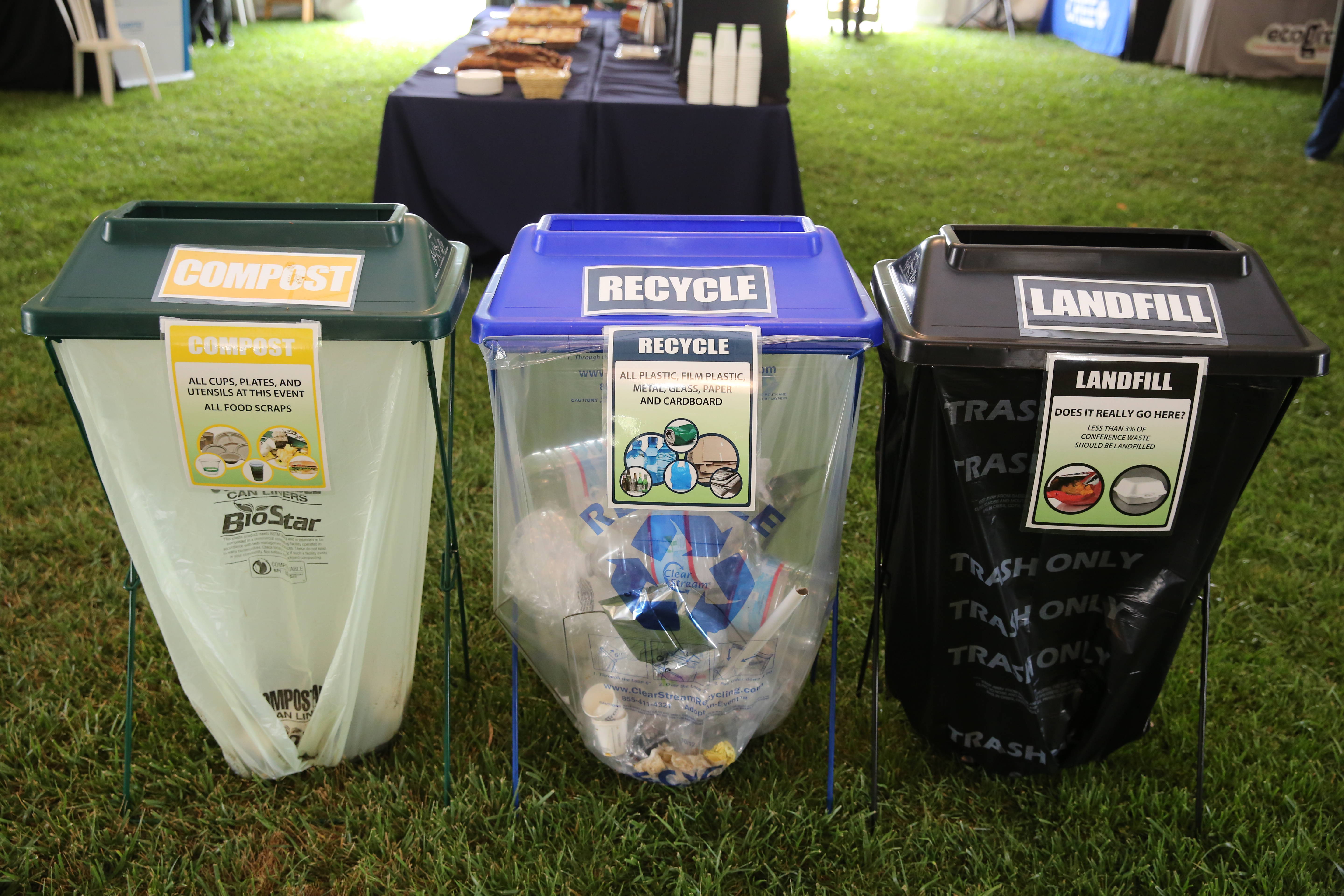
AS Recycling’s Zero Waste Event Service includes:
- Distinctive and reusable color-coded trash, recycling, and compost bins
- Proper signage for all stations with comprehensive visual instructions
- Bin service: clean, set up, and take down by student staff
- Removal of collected waste
Add-on services available:
- Pre-event consultation on how to reduce potential sources of waste, maximize resource efficiency, and reduce costs
- Staff members who will remain on site and monitor bins to ensure proper disposal of waste
- Waste audit report and calculation of the total diversion rate
- Compostable ware (ex. plates, cups, forks, etc…) for sale with a valid A.S. account through Zero Waste Committee
- Water service from Spring Mountain Water in Santa Barbara
To schedule A.S. Recycling’s Zero Waste services at your next event, please fill out our request form after reading our policy page.
For very large events:
You may want to consider requesting additional custodial and grounds staff assistance or additional dumpsters and dumpster pickups. Contact Facilities Management at x8300 or place a work order through their TMA system to request these services.
